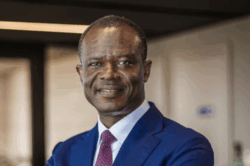Globally, countries are experiencing a rapid expansion of digitisation and technological advancements that touch on nearly all aspects of life. In general, the surge in digitisation has improved operational efficiency and service delivery in all the key sectors of public and commercial importance – from manufacturing and industry, to business and commercial operations, agriculture, health, education and finance.
Where the debate does exist, it highlights the growing tension between an evolving consumer payments landscape, a desire for increased business efficiency, and a growing concern that unbanked and underbanked consumers may be marginalised in a cashless economy. Only a few countries around the world can boast of being a cashless state, although several nations are making moves to eliminate cash in the system. Notable among countries which are said to be cashless societies is Sweden. For instance, in Sweden it is common to see signs that say ‘No cash accepted’ in shops.
Ghana is one of such countries across the West African sub-region that are making efforts to become a cashless society. In furtherance to this effort, the Vice President of Ghana has hinted at steps being taken by government to push toward a cashless economy. Among them was launching the National Interoperability platform and introducing a universal QR code payment system in a bid toward establishing a cashless society in Ghana.
Credit and Debit Card Usage in Ghana: Our analysis shows that electronic payment methods witnessed GH¢70million in credit card transactions and GH¢13.58million in debit card transactions for 2016. The credit card boom has not yet reached Ghana.
This is because credit card fraud is prevalent in Ghana, leading to what has until recently been a cash-based economy. Ghanaians who are afraid that their card number will be reused fraudulently, or that they might be charged more than once by the same vendor, are apprehensive to adopt this common payment method despite the switch to MasterCard, Visa cards etc. in recent years.
The number of E-Zwich card holders was 2,774,799 at the end of December 2018, which showed an increase of 17.4 percent over the 2017 position. Furthermore, prepaid cards issued in 2018 increased to 216,592 from 86,017 in 2017. The increase in the number of prepaid cards was due to new banks being authorised by the Bank of Ghana to provide prepaid card services (Payment Systems Oversight Annual Report, 2018). This behavioural shift can partially be attributed to marketing from credit card companies aimed at increasing usage of cards purchases, so people are increasingly comfortable using their credit cards for smaller transactions at places like drug-stores, convenience stores and coffee shops.
Secondly, this trend isn’t limited to the financial sector. Transaction amount at which consumers prefer their cards to cash had informed banks to roll out a total of 7,356 POSs by the same date at various merchant points, mostly in the urban centres at the end of 2017. The rise of digital payments, which includes traditional debit and prepaid cards as well as mobile payments, has contributed to the steady shift in payment practices among consumers. As smartphone penetration and digital payments expand, so will cashless capabilities.
For some business, a cashless business model is a strategic choice that provides clear benefits. While much of the current narrative regarding a cashless society is focused on the downside, there are advantages for both business owners and consumers. The key is understanding customer payment preferences. The cashless reversal trend is not unique to fuel service stations or even to small retail outlets. The fast-casual pizza and salad chain has made the decision to start accepting both cash and digital to ensure that everyone can access their restaurants.
We predict that the tipping point will come as younger, tech-savvy generations integrate their own digital payment habits into their own businesses in the future. This, coupled with concerted efforts to build bridges across the banking and digital divides, will enable a big shift toward cashless.
But for now, in markets where the choice to go cashless is not limited by legislation, business owners and managers should look at their transaction data to determine which payment strategy will preserve the health of their business while catering to the unique needs of their customers. In today’s competitive and ever-changing restaurant and retail landscape, brick and mortar businesses need to ensure one simple thing: that they never miss a sale.
The Upside to Going Cashless
Eliminating cash would speed up transaction times. Everything would be processed digitally. Slow processing times would be a thing of the past. Merchants could benefit from going cashless because they would not have to keep cash on hand. Thieves are less likely to target a store that does not have cash available, and merchants could cut down on security associated with cash protection. However, those security savings may be offset by increased cybersecurity measures that would likely be required from going cashless. Cost associated with handling paper money as well as storing and depositing is absent.
Drawbacks of eliminating cash
Data breaches are another cause for concern in a cashless society. If all transactions are processed in a digital form, payment information becomes significantly more vulnerable. Merchants would have to increase security measures to combat these risks, and those costs could once again be passed to the consumer.
Unreliable networks are another challenge facing the implementation of a cashless system in Ghana. This makes it difficult to transact cashless activities: customers cannot perform their online business and activities, while institutions keep complaining of network failures in their operations. This means for a cashless system to operate fully, these challenges need to be addressed quickly to yield the desired results.
The Verdict
Is a cashless society good for Ghana? While there are many perks to going cashless, a World Bank report showed that 70% of Ghana’s households are unbanked, and for that reason still carry cash. Not all Ghanaians have the means to eliminate cash. The reasons range from tipping to budget management to emergency funding; but the real reason may ultimately come down to familiarity. Cash is tangible, quantifiable, and reliable. If the Internet is down, the power goes out, or a system gets hacked, cash is there to cover the transaction. No matter how much we transition to digital and card-based payments, cash seems to have a place in Ghana for the foreseeable future. Therefore, Cash is King.
Recommendations
Firstly, SMEs prefer cash payments to electronic payment because they perceive that transactional fees make it expensive. Businesses push any extra cost incurred to the final consumer, which means SMEs would either prefer the traditional cash system or pass the cost on to consumers that would not favour government policy. It is therefore recommended that government should engage banks and telecommunications companies to find possible ways of eliminating these charges. For instance, government could provide incentives in the form of tax-reliefs.
Secondly, High illiteracy rate and Identity theft are challenges within the banking industry. Recently, government introduced Free SHS – which seeks to improve the literacy rate in the country. While this effort is commendable, it is recommended that government should partner with the banks to invest more in technological education – using the media as a platform where those who lack basic knowledge can learn how to use smartphones and other gadgets; and also provide guidance on how to transact safely without losing personal information to scammers.
It also recommends that government should join forces with stakeholders within the economy to invest heavily in cybersecurity as well as ensuring the provision of reliable networks by the Telcos, because these are the challenges facing implementation of a cashless system in Ghana.
Authors;
Edmund Obeng Amaning is a researcher/consultant and holds a Master’s degree in Economics. His research interests include Finance and Monetary economics, Public finance and Energy. Contact: [email protected], Cell: +233 54 347 5499
Justice Ohemeng-Boakye is a banker with a strong knowledge in Clients and E-banking services. He is a researcher and holds a Master’s degree in Economics. Contact: [email protected]
Cell: +233 24 519 2745.










